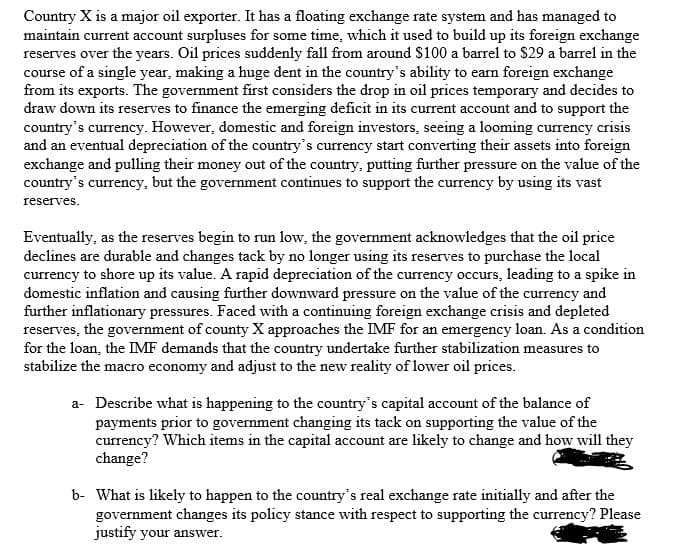Country X is a major oil exporter. It has a floating exchange rate system and has managed to maintain current account surpluses for some time, which it used to build up its foreign exchange reserves over the years. Oil prices suddenly fall from around $100 a barrel to $29 a barrel in the course of a single year, making a huge dent in the country's ability to earn foreign exchange from its exports. The government first considers the drop in oil prices temporary and decides to draw down its reserves to finance the emerging deficit in its current account and to support the country's currency. However, domestic and foreign investors, seeing a looming currency crisis and an eventual depreciation of the country's currency start converting their assets into foreign exchange and pulling their money out of the country, putting further pressure on the value of the country's currency, but the government continues to support the currency by using its vast reserves. Eventually, as the reserves begin to run low, the government acknowledges that the oil price declines are durable and changes tack by no longer using its reserves to purchase the local currency to shore up its value. A rapid depreciation of the currency occurs, leading to a spike in domestic inflation and causing further downward pressure on the value of the currency and further inflationary pressures. Faced with a continuing foreign exchange crisis and depleted reserves, the government of county X approaches the IMF for an emergency loan. As a condition for the loan, the IMF demands that the country undertake further stabilization measures to stabilize the macro economy and adjust to the new reality of lower oil prices. a- Describe what is happening to the country's capital account of the balance of payments prior to government changing its tack on supporting the value of the currency? Which items in the capital account are likely to change and how will they change? b- What is likely to happen to the country's real exchange rate initially and after the government changes its policy stance with respect to supporting the currency? Please justify your answer.
Country X is a major oil exporter. It has a floating exchange rate system and has managed to maintain current account surpluses for some time, which it used to build up its foreign exchange reserves over the years. Oil prices suddenly fall from around $100 a barrel to $29 a barrel in the course of a single year, making a huge dent in the country's ability to earn foreign exchange from its exports. The government first considers the drop in oil prices temporary and decides to draw down its reserves to finance the emerging deficit in its current account and to support the country's currency. However, domestic and foreign investors, seeing a looming currency crisis and an eventual depreciation of the country's currency start converting their assets into foreign exchange and pulling their money out of the country, putting further pressure on the value of the country's currency, but the government continues to support the currency by using its vast reserves. Eventually, as the reserves begin to run low, the government acknowledges that the oil price declines are durable and changes tack by no longer using its reserves to purchase the local currency to shore up its value. A rapid depreciation of the currency occurs, leading to a spike in domestic inflation and causing further downward pressure on the value of the currency and further inflationary pressures. Faced with a continuing foreign exchange crisis and depleted reserves, the government of county X approaches the IMF for an emergency loan. As a condition for the loan, the IMF demands that the country undertake further stabilization measures to stabilize the macro economy and adjust to the new reality of lower oil prices. a- Describe what is happening to the country's capital account of the balance of payments prior to government changing its tack on supporting the value of the currency? Which items in the capital account are likely to change and how will they change? b- What is likely to happen to the country's real exchange rate initially and after the government changes its policy stance with respect to supporting the currency? Please justify your answer.
Brief Principles of Macroeconomics (MindTap Course List)
8th Edition
ISBN:9781337091985
Author:N. Gregory Mankiw
Publisher:N. Gregory Mankiw
Chapter13: Open-economy Macroeconomics: Basic Concepts
Section: Chapter Questions
Problem 9PA
Related questions
Question

Transcribed Image Text:Country X is a major oil exporter. It has a floating exchange rate system and has managed to
maintain current account surpluses for some time, which it used to build up its foreign exchange
reserves over the years. Oil prices suddenly fall from around $100 a barrel to $29 a barrel in the
course of a single year, making a huge dent in the country's ability to earn foreign exchange
from its exports. The government first considers the drop in oil prices temporary and decides to
draw down its reserves to finance the emerging deficit in its current account and to support the
country's currency. However, domestic and foreign investors, seeing a looming currency crisis
and an eventual depreciation of the country's currency start converting their assets into foreign
exchange and pulling their money out of the country, putting further pressure on the value of the
country's currency, but the government continues to support the currency by using its vast
reserves.
Eventually, as the reserves begin to run low, the government acknowledges that the oil price
declines are durable and changes tack by no longer using its reserves to purchase the local
currency to shore up its value. A rapid depreciation of the currency occurs, leading to a spike in
domestic inflation and causing further downward pressure on the value of the currency and
further inflationary pressures. Faced with a continuing foreign exchange crisis and depleted
reserves, the government of county X approaches the IMF for an emergency loan. As a condition
for the loan, the IMF demands that the country undertake further stabilization measures to
stabilize the macro economy and adjust to the new reality of lower oil prices.
a- Describe what is happening to the country's capital account of the balance of
payments prior to government changing its tack on supporting the value of the
currency? Which items in the capital account are likely to change and how will they
change?
b- What is likely to happen to the country's real exchange rate initially and after the
government changes its policy stance with respect to supporting the currency? Please
justify your answer.
Expert Solution
This question has been solved!
Explore an expertly crafted, step-by-step solution for a thorough understanding of key concepts.
Step by step
Solved in 3 steps

Knowledge Booster
Learn more about
Need a deep-dive on the concept behind this application? Look no further. Learn more about this topic, economics and related others by exploring similar questions and additional content below.Recommended textbooks for you

Brief Principles of Macroeconomics (MindTap Cours…
Economics
ISBN:
9781337091985
Author:
N. Gregory Mankiw
Publisher:
Cengage Learning

Principles of Economics (MindTap Course List)
Economics
ISBN:
9781305585126
Author:
N. Gregory Mankiw
Publisher:
Cengage Learning

Principles of Macroeconomics (MindTap Course List)
Economics
ISBN:
9781305971509
Author:
N. Gregory Mankiw
Publisher:
Cengage Learning

Brief Principles of Macroeconomics (MindTap Cours…
Economics
ISBN:
9781337091985
Author:
N. Gregory Mankiw
Publisher:
Cengage Learning

Principles of Economics (MindTap Course List)
Economics
ISBN:
9781305585126
Author:
N. Gregory Mankiw
Publisher:
Cengage Learning

Principles of Macroeconomics (MindTap Course List)
Economics
ISBN:
9781305971509
Author:
N. Gregory Mankiw
Publisher:
Cengage Learning

Economics: Private and Public Choice (MindTap Cou…
Economics
ISBN:
9781305506725
Author:
James D. Gwartney, Richard L. Stroup, Russell S. Sobel, David A. Macpherson
Publisher:
Cengage Learning

Macroeconomics: Private and Public Choice (MindTa…
Economics
ISBN:
9781305506756
Author:
James D. Gwartney, Richard L. Stroup, Russell S. Sobel, David A. Macpherson
Publisher:
Cengage Learning

Macroeconomics: Principles and Policy (MindTap Co…
Economics
ISBN:
9781305280601
Author:
William J. Baumol, Alan S. Blinder
Publisher:
Cengage Learning